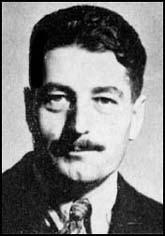Gustave Bieler

Gustave Bieler was born in Canada. During the Second World War Bieler joined the Special Operations Executive (SOE). One of those involved in his training wrote: "very conscientious, keen and intelligent, sound judge of character; good natured; even tempered; absolutely reliable; outstandingly thorough and painstaking; born organizer."
On 18th November, 1942, Bieler and Michael Trotobas, were dropped in northern France. Given the code name "Guy", Bieler was appointed as head of the Musician Network in the St Quentin region of occupied France in March 1943. In the second-half of 1943 his group were regularly cutting the main railway line from St. Quentin to Lille.
In January 1944, Bieler and his radio operator, Yolande Beekman, were arrested while together at the Café Moulin Brulé. Bieler was shot soon after by the Schutz Staffeinel (SS) at Fossenburg.
Primary Sources
(1) Maurice Buckmaster, Specially Employed (1952)
Gustave Bieler asked for a tough assignment, and he was right, for by reason of his size alone, he would have been conspicuous in, say, Toulouse or Paris, and the tough areas were in the north and east of France. We settled on St. Quentin, for we knew of a group of patriots there who were anxious for liaison with London, and St. Quentin seemed likely to develop into a key town for German railway and canal communications.
The next thing to decide was the composition of the team. Bieler had such an outstanding personality that it was difficult to find a suitable partner for him. After a good deal of thought, we decided on Yolande, a girl of Swiss extraction sent to us by the WAAF. Her French was perfect - the touch of Swiss accent was a positive advantage, as it diverted attention from her rather typically English appearance. She was very quiet and homely - she had gained immense popularity at the wireless school by taking over unofficially the duties of darner of socks for the men-and her unruffled cheerfulness and good humour were a great asset. She quickly developed an easy camaraderie with Bieler which promised well for their future work.
Bieler had towards all the women engaged in our work a kind of amused tolerance which some might have faintly resented. But Yolande took his attitude without offence, and her very unaffectedness and simplicity evoked his esteem and admiration.
(2) M. R. D. Foot, SOE in France (1966)
In one big camp at least, Belsen, prisoners were so desperately short of food that many of them ate raw fragments cut off their dead companions' bodies. Most of the agents who were strong enough to survive the insane 'ordinary' regime were butchered in two distinct massacres: one in the first half of September 1944, the other much later on, a few weeks from the end of the European war, on 29 March 1945. On directives issuing directly from Hitler, most of them were hanged, as the conspirators of 20 July were hanged, with nooses made of piano wire; this was meant to make their deaths as slow and as degrading as could be. Nevertheless they almost all impressed their fellow prisoners with their lasting defiance of the enemy. Gustave Bieler is said to have made so powerful an impression on his captors that when the order for his execution came from Berlin even the S S at Flossenburg mounted a guard of honour to escort him as he limped to his death.
